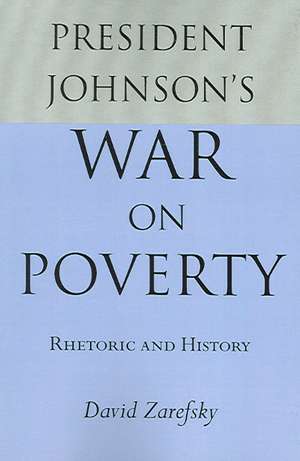President Johnson's War On Poverty: Rhetoric and History: Studies in Rhetoric and Communication
Autor David Zarefskyen Limba Engleză Paperback – 20 aug 2005
Illustrates the interweaving of rhetorical and historical forces in shaping public policy
In January 1964, in his first State of the Union address, President Lyndon Johnson announced a declaration of “unconditional war” on poverty. By the end of the year the Economic Opportunity Act became law.
The War on Poverty illustrates the interweaving of rhetorical and historical forces in shaping public policy. Zarefsky suggest that an important problem in the War on Poverty lay in its discourse. He assumes that language plays a central role in the formulation of social policy by shaping the context within which people view the social world. By terming the anti-poverty effort a war, President Johnson imparted significant symbolism to the effort: it called for total victory and gave confidence that the “war” was winnable. It influenced the definition of the enemy as an intergenerational cycle of poverty, rather than the shortcomings of the individual; and it led to the choice of community action, manpower programs, and prudent management as weapons and tactics. Each of these implications involves a choice of language and symbols, a decision about how to characterize and discuss the world. Zarefsky contends that each of these rhetorical choices was helpful to the Johnson administration in obtaining passage of the Economic Opportunity Ac of 1964, but that each choice invited redefinition or reinterpretation of a symbol in a way that threatened the program.
In January 1964, in his first State of the Union address, President Lyndon Johnson announced a declaration of “unconditional war” on poverty. By the end of the year the Economic Opportunity Act became law.
The War on Poverty illustrates the interweaving of rhetorical and historical forces in shaping public policy. Zarefsky suggest that an important problem in the War on Poverty lay in its discourse. He assumes that language plays a central role in the formulation of social policy by shaping the context within which people view the social world. By terming the anti-poverty effort a war, President Johnson imparted significant symbolism to the effort: it called for total victory and gave confidence that the “war” was winnable. It influenced the definition of the enemy as an intergenerational cycle of poverty, rather than the shortcomings of the individual; and it led to the choice of community action, manpower programs, and prudent management as weapons and tactics. Each of these implications involves a choice of language and symbols, a decision about how to characterize and discuss the world. Zarefsky contends that each of these rhetorical choices was helpful to the Johnson administration in obtaining passage of the Economic Opportunity Ac of 1964, but that each choice invited redefinition or reinterpretation of a symbol in a way that threatened the program.
Din seria Studies in Rhetoric and Communication
-
 Preț: 257.95 lei
Preț: 257.95 lei -
 Preț: 249.48 lei
Preț: 249.48 lei -
 Preț: 258.14 lei
Preț: 258.14 lei -
 Preț: 297.90 lei
Preț: 297.90 lei -
 Preț: 280.57 lei
Preț: 280.57 lei -
 Preț: 237.01 lei
Preț: 237.01 lei -
 Preț: 189.43 lei
Preț: 189.43 lei -
 Preț: 259.44 lei
Preț: 259.44 lei - 13%
 Preț: 359.37 lei
Preț: 359.37 lei -
 Preț: 225.06 lei
Preț: 225.06 lei
Preț: 297.37 lei
Nou
Puncte Express: 446
Preț estimativ în valută:
56.91€ • 61.79$ • 47.80£
56.91€ • 61.79$ • 47.80£
Carte indisponibilă temporar
Doresc să fiu notificat când acest titlu va fi disponibil:
Se trimite...
Preluare comenzi: 021 569.72.76
Specificații
ISBN-13: 9780817352455
ISBN-10: 0817352457
Pagini: 304
Dimensiuni: 152 x 229 x 28 mm
Greutate: 0.4 kg
Ediția:First Edition, First Edition
Editura: University Of Alabama Press
Colecția University Alabama Press
Seria Studies in Rhetoric and Communication
ISBN-10: 0817352457
Pagini: 304
Dimensiuni: 152 x 229 x 28 mm
Greutate: 0.4 kg
Ediția:First Edition, First Edition
Editura: University Of Alabama Press
Colecția University Alabama Press
Seria Studies in Rhetoric and Communication
Notă biografică
David Zarefsky is Professor of Communication Studies and Associate Dean, The School of Speech, Northwestern University.
Descriere
Illustrates the interweaving of rhetorical and historical forces in shaping public policy
